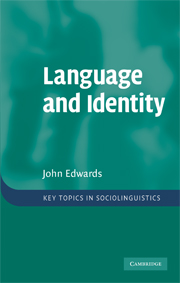Book contents
- Frontmatter
- Contents
- 1 Introduction
- 2 Identity, the individual and the group
- 3 Identifying ourselves
- 4 Language, dialect and identity
- 5 Dialect and identity: beyond standard and nonstandard
- 6 Language, religion and identity
- 7 Language, gender and identity
- 8 Ethnicity and nationalism
- 9 Assessments of nationalism
- 10 Language and nationalism
- 11 Language planning and language ecology
- Glossary
- Notes
- References
- Index
- References
4 - Language, dialect and identity
Published online by Cambridge University Press: 05 June 2012
- Frontmatter
- Contents
- 1 Introduction
- 2 Identity, the individual and the group
- 3 Identifying ourselves
- 4 Language, dialect and identity
- 5 Dialect and identity: beyond standard and nonstandard
- 6 Language, religion and identity
- 7 Language, gender and identity
- 8 Ethnicity and nationalism
- 9 Assessments of nationalism
- 10 Language and nationalism
- 11 Language planning and language ecology
- Glossary
- Notes
- References
- Index
- References
Summary
LANGUAGE
Language defined
Edward Sapir once stated that ‘language is a purely human and non-instinctive method of communicating ideas, emotions, and desires by means of a system of voluntarily produced symbols’ (1921: 7). A little later, Morris (1946) described it as an arrangement of arbitrary symbols possessing an agreed-upon significance within a community; furthermore, these symbols can be used and understood independent of immediate contexts, and they are connected in regular ways. First, then, language is a system, which implies regularity and rules of order. Second, this system is an arbitrary one inasmuch as its particular units or elements have meaning only because of users' agreement and convention. And third, language is used for communicative purposes by a group of people who constitute the speech or language community. So, a language might be considered as
a communication system composed of arbitrary elements which possess an agreed-upon significance within a community. These elements are connected in rule-governed ways. The existence of rules (that is to say, grammar) is necessary for comprehension, of course, but it is also essential for the virtually infinite creativity (or productivity) of a system that rests upon a finite number of linguistic gears and axles.
[My paraphrase, J.E.]Implicit here is the idea that languages differ from one another in the ways in which they assign meaning to sounds and symbols.
- Type
- Chapter
- Information
- Language and IdentityAn introduction, pp. 53 - 72Publisher: Cambridge University PressPrint publication year: 2009



